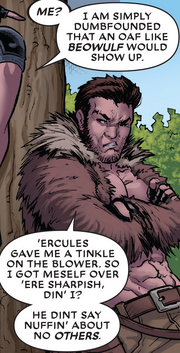- —Beowulf[src]
History
Early Life[]

Fighting the Beast-God
In the "dark centuries between the Final Cataclysm and the beginning of recorded history", Beowulf, a veteran of a thousand campaigns, and an army of Vandals arrived in Vanaria, on the coast of the Northern Islands, and soon found himself rescuing a woman who was tied to a tree, a sacrifice for the "Beast-God", one of Old Ones. Beowulf killed the Beast-God, and he and his men were led to the king as heroes, but soon turned to looting. Beowulf slew the king and took over the kingdom but Princess Ulana escaped with her father's ring. His rule was soon challenged with the return of the creature he thought he had killed, but who became corporeal and then disappeared into the "Land of Shadows" at will. Once the creature has killed enough of the Vandals, Beowulf was overpowered and captured by Vanarians, who tied him to the sacrificial tree. Ulana came to free him and give him the ring, in fact poisoned. Unaware he was dead, Beowulf battled the Ghost-Beast and triumphed yet again, only to find that he himself was actually a ghost, killed by the poisoned ring. Beowulf allegedly haunted the ruins of Vanaria since then.[3]
The era of those events remains unrevealed, and it is unclear whether or not this Beowyulf is supposed to be the same as the Beowulf from the poem.
Origin[]
Beowulf was the son of Ecgtheow,[5] and was of the Götar (or Geats), the people of Götaland (in modern-day southern Sweden,[6] and also known as Geatland.[7] Beowulf was also the champion of the Geats.[5] Ecgtheow died before Beowulf went to confront Grendell.[7]
Adventures[]
it was considered unclear whether or not Beowulf truly lived: Both immortal adventurers, Ulysses Bloodstone as well as the Eternal Forgotten One used the name.[6]
Also, many aspects of Beowulf's story were subject to contestation or proven heavily modified.
Grendell and her Mother[]
According to legends, stories about the hideous man-eating monster Grendell (who lived with his mother in the lakes and marshes of Zealand island (modern-days Denmark), raiding each night Danish king Hrothgar's home Heorot Hall eventually reached Götaland. Allegedly to repay a debt of Ecgtheow toward Hrothgar, Beowulf went to Heorot Hall along with fourteen fellow thanes to kill Grendell.
Grendell ate of Beowulf's men during such a raid, before Beowulf mortally wounded him by tearing his left arm away. Grendell in fact survived thanks tp his mother's magic.[7]
This version is contested on some aspects:
- Beowulf had been absent when the Danes were invaded by the symbiote dragon called Grendel. Instead, Thor Odinson - the God of Thunder - arrived to save his people,[8] forming the basis for the legend of Beowulf slaying a dragon with his sword.[9]
- Beowulf allegedly did attack Grendel's Mother, using the magical sword Excalibur to drive her back, banishing her into an underground prison,[5] rather than slaying her.[10][5]
- Another account mentions that Grendell may had been confused for with either Ulysses Bloodstone or the Eternal Forgotten One.[7]
After Grendel's vengeful mother started killing Danes,[7] and attacked the hall as well, Beowulf tracked her to her lair[11] and slew her.[10][5]
King of the Geats[]
Historically, Beowulf was King of the Geats,[6] and ruled for fifty years before being killed by a dragon,[citation needed] his last and foremost adversary, whose vast dragon secretly included the Holy Grail.[5]
James Allison stated that the tale of Beowulf killing the fire-monster, and many other similar accounts, were mythical tales originated as a pale racial memory of the battle of one of his previous incarnations, Niord, with the "worm" of the Country of the Worm.[4]
Long afterwards, the old legends were transcribed into an epic poem by a British descendant of the Geats,[11] who falsified many details of Beowulf's adventures.[12][verification needed] The poem was considered as equals with Gilgamesh or with Siegfried and Kriemhild from the Nibelung.[13]
However, he returned, somehow becoming an immortal warrior living on the British Isles. At some point, he developed an antagonistic relationship with Theseus, a fellow warrior who took the habit to refer to him as "Wulfie",[1] and seemingly witnessed Olympians' tantrums.[2]
Modern Age[]
In modern days, Beowulf was possibly the most famous of Sweden's people (though predating the country's formation).[6]

As Hercules wished to assemble warriors to confront the Uprising Storm, a group of new Gods seeking to destroy the gods of old, Gilgamesh worried to be unfit and proposed to call Theseus, Beowulf and/or Rostam instead.[14]
Beowulf was resting at his home on the coast of Ireland when he was contacted by Hercules on his mobile for a meeting of the "Gods of War", and hesitated before answering him. He brought them to New York City to battle the Uprising Storm, where he was reunited with Theseus. Before the meeting could end, the Uprising Storm attacked. Beowulf battled Catastrophobia but was no match for the new god. Theseus gloated after shooting Catastrophobia with a rifle, believing he saved Wulfie's life, but the new god just stood back up.[1]Attributes
Powers
- Immortality: He was seen in the Modern Age as a middle-aged man in a prime physical form.[1]
Paraphernalia
Equipment
Weapons
Notes
- It remains unrevealed what relation, if any, exists between the Beowulf from the epic poem and the Beowulf featured in Tower of Shadows #6.
- The Appendix to the Handbook of the Marvel Universe considers the latter to "[have] not been made part of canon/continuity".[15]
Trivia
- Beowulf has a little Spartan soldier key chain on his cellphone.[1]
See Also
- 4 appearance(s) of Beowulf (Earth-616)
- 1 minor appearance(s) of Beowulf (Earth-616)
- 11 mention(s) of Beowulf (Earth-616)
- 4 mention(s) in handbook(s) of Beowulf (Earth-616)
- 8 image(s) of Beowulf (Earth-616)
- 1 quotation(s) by or about Beowulf (Earth-616)
- 1 item(s) used/owned by Beowulf (Earth-616)
Links and References
References
- ↑ 1.0 1.1 1.2 1.3 1.4 1.5 1.6 1.7 Civil War II: Gods of War #2
- ↑ 2.0 2.1 Civil War II: Gods of War #3
- ↑ 3.0 3.1 Tower of Shadows #6
- ↑ 4.0 4.1 Supernatural Thrillers #3
- ↑ 5.0 5.1 5.2 5.3 5.4 5.5 Captain Marvel (Vol. 4) #21
- ↑ 6.0 6.1 6.2 6.3 Marvel Atlas #1 ; Sweden's profile
- ↑ 7.0 7.1 7.2 7.3 7.4 Thor: Asgard's Avenger #1 ; Grendell's profile
- ↑ Venom (Vol. 4) #4
- ↑ Cates, Donny (8 November 2018) DONNY CATES on Twitter: "The Grendel is an ancient symbiote dragon that was the basis for the Beowulf legend. Our Venom run is wild as hell man." Twitter. Retrieved on 8 November 2018.
- ↑ 10.0 10.1 Captain Marvel (Vol. 4) #20
- ↑ 11.0 11.1 Official Handbook of the Marvel Universe: Horror 2005 #1 ; Big Mother's profile
- ↑ Scream: Curse of Carnage #1–2
- ↑ Marvel Zombies Supreme #4
- ↑ Hercules (Vol. 4) #3
- ↑ Beowulf's entry, Master List at the Appendix to the Handbook of the Marvel Universe (How to Use the Master List)
